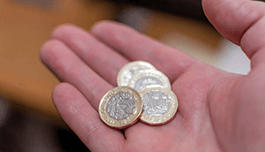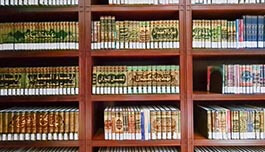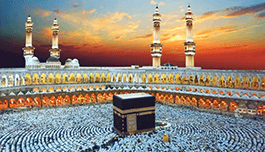The trees of Paradise, as described in the Qur’an and hadiths, are lush, thornless, and bear abundant fruit of various kinds, including grapes, pomegranates, date palms and bananas piled high. They provide extended shade, with flowing streams around them, and their fruits are always in season, offering a continuous supply. The trees have beautiful, dark green foliage with low-hanging fruits within easy reach, and the fruits have diverse tastes and appearances. The trees of Jannah are a source of eternal provision and pleasure for its inhabitants.
How to get more trees in Jannah
The good news is that you can increase the number of your trees in Jannah, creating endless forests and parks where you can walk, eat and enjoy yourself.
The way to cultivate more trees in Jannah is through the remembrance of Allah (dhikr) as mentioned in various hadiths, using the following seven phrases of dhikr (rememberance) and tasbeeh (glorification):
| No. | Arabic Text | English Pronunciation | English Translation |
|---|---|---|---|
| 1 | سُبْحَانَ الله | Subhan’Allah | Glory be to Allah |
| 2 | الْحَمْدُ لِلَّهِ | Alhamdulillah | All praise is due to Allah |
| 3 | لَا إِلَٰهَ إِلَّا الله | La ilaha illa Allah | There is no god but Allah |
| 4 | الله أَكْبَر | Allahu Akbar | Allah is the Greatest |
| 5 | لَا حَوْلَ وَلَا قُوَّةَ إِلَّا بِالله | La hawla wala quwwata illa billah | There is no power and no strength except with Allah |
| 6 | سُبْحَانَ اللَّهِ الْعَظِيمِ وَبِحَمْدِهِ | Subhan’Allahi Al-Adhim wa bihamdihi | Glory be to Allah, the Magnificent, and Praised is He |
| 7 | سُبْحَانَ اللَّهِ وَبِحَمْدِهِ | Subhan’Allahi wabihamdihi | Glory be to Allah and Praised is He |
1. Saying ‘Subhan’Allah’, ‘Alhamdulillah’, ‘La ilaha illa Allah’ and ‘Allahu Akbar’
Hadith 1. ‘Abdullah ibn Mas’ud reported that the Messenger of Allah (ﷺ) said: “I met Prophet Ibrahim on Al-Isra’ wal-Mi’raj and he said: “O Muhammad, convey my greetings to your nation and tell them that Paradise is a land whose soil is good and its water is sweet. It is an empty plain which will be planted with Subhan’Allah, Alhamdulillah, La ilaha illa Allah and Allahu Akbar.” (Narrated by Al-Tirmidhi (3462) and Al-Tabarani (10363). Classed as Hasan by Ibn Hajar Al-Asqalani in Hidayat al-Ruwat (2/439)).
Hadith 2. Abu Hurairah reported that the Messenger of Allah (ﷺ) passed by me when I was planting something and asked me: “O Abu Hurairah, what are you planting?” I said: “Plants for myself.” He said: “Shall I not tell you of a plants that is better than this?” He said: “Of course, O Messenger of Allah!” He said: “Say: Subhan’Allah, Alhamdulillah, La ilaha illa Allah and Allahu Akbar. For each one a tree will be planted for you in Paradise.” (Narrated by Ibn Majah (3807) and authenticated by Al-Suyuti in Al-Jami’ Al-Saghir (2856) and Al-Albani in Sahih al-Jami’ (2613)).
2. Saying ‘La hawla wala quwwata illa billah’
Hadith 1. It was narrated from Abu Ayyub Al-Ansari that the Messenger of Allah (ﷺ) passed by Ibrahim on the night he was taken on the Night Journey. Ibrahim said: “Who is with you, O Jibril?” Jibril said: “This is Muhammad.” Ibrahim then said to him: “Tell your Ummah to plant many seedlings in Paradise, for its soil is good, and its land is spacious.” The Prophet asked: “And what are the seedlings of Paradise?” Ibrahim replied: “‘La hawla wala quwwata illa billah’ (There is no power and no strength except with Allah).”
(Narrated by Ahmad (23552), Ibn Hibban (821), al-Bayhaqi (657) and Al-Tabarani (3898). Al-Haythami said in Majma’ Al-Zawa’id (10/100): “Its narrators are the narrators of the Sahih (authentic collections), except for Abdullah ibn Abdul Rahman, and he is trustworthy; no one has spoken against him, and Ibn Hibban deemed him reliable.”).
The term “غراس” (“plantings”) or (“seedlings”) refers to the act of planting or the things that are planted, which can include seedlings, trees and plants.
Hadith 2. It was narrated from Ibn Umar that the Messenger of Allah (ﷺ) said: “Plant many trees in Paradise, for its water is sweet and its soil is good. So plant many trees there by saying: ‘There is no power and no strength except with Allah.'” (Narrated by Al-Tabarani in “Al-Mu’jam Al-Kabir” (13354), classed as Hasan by Al-Albani in Sahih Al-Jami’ (1213)).
3. Saying ‘Subhan’Allahi wabihamdihi’ and ‘Subhan’Allahi Al-Adhim wa bihamdihi’
Hadith 1. ‘Abdullah ibn ‘Amr said that he heard the Prophet (ﷺ) say: “Whoever says ‘Subhan’Allahi wabihamdihi’ (Glory be to Allah and with His praise), a date palm tree will be planted for him in Paradise.” (Narrated by Al-Bazzar (2468) and Ibn Hibban (826). Al-Haythami said in Majma’ Al-Zawa’id (10/97): “Its chain of transmission is good.”).
Hadith 2. Jaabir ibn ‘Abdullah reported that the Messenger of Allah (ﷺ) said: “Whoever says ‘Subhan’Allahi Al-Adhim wa bihamdihi’ (Glory be to Allah, the Magnificent, and with His praise), a date palm tree will be planted for him in Paradise.” (Narrated by Al-Tirmidhi (3464) and Al-Nasa’i in “Al-Kubra” (10663). Authenticated by Al-Albani in Sahih al-Jami’ (6429)).
Al-Munawi said in Faydh al-Qadir: ‘The saying ‘A date palm tree will be planted for him in Paradise’ meaning: a date palm tree will be planted for him each time he says it. The date palm is specifically mentioned because of its many benefits and the goodness of its fruit.’
An inspirational story
Imagine a man named Amir, a devoted servant of Allah, who spent his days immersed in the remembrance of his Creator with various phrases of dhikr and tasbeeh. One night, Amir dreamt he was walking through a magnificent garden. The trees were unlike any he had ever seen, with fruits of all kinds hanging low and within reach. Streams of crystal-clear water flowed gently, and the air was filled with the sweetest fragrances. He felt an overwhelming sense of peace and joy.
As he walked, an old man approached him and said, “Do you recognise this place?” Amir shook his head, and the man smiled. “This is your garden in Jannah, planted by your dhikr. Each ‘Subhan’Allah’, ‘Alhamdulillah’, ‘La ilaha illa Allah’, ‘Allahu Akbar’ and ‘La hawla wala quwwata illa billah’ has grown into these beautiful trees. Every ‘Subhan’Allahi Al-Adhim wa bihamdihi’ and ‘Subhan’Allahi wabihamdihi’ has produced these delightful date palms. They are a reward of the dhikr you used to perform in the Dunya.”
Amir awoke with tears of joy, realising that his daily remembrance of Allah was not just a habit but an investment in his eternal paradise. From that day on, he increased his dhikr, knowing that with every utterance, he was adding to his glorious garden in Jannah, a place of eternal beauty and delight.
Conclusion
The trees of Paradise are a delight to look at, their fruits are delicious, and their shade is long and comforting. By saying the above seven phrases 100 times a day, which takes less than 15 minutes, you plant for yourself 700 trees daily or 255,500 trees in a year!
| No. of Dhikr | Trees Per Day | Trees Per Month | Trees Per Year |
|---|---|---|---|
| 10 | 10 | 300 | 3,650 |
| 100 | 100 | 3,000 | 36,500 |
| 200 | 200 | 6,000 | 73,000 |
| 300 | 300 | 9,000 | 109,500 |
| 400 | 400 | 12,000 | 146,000 |
| 500 | 500 | 15,000 | 182,500 |
| 600 | 600 | 18,000 | 219,000 |
| 700 | 700 | 21,000 | 255,500 |
| 800 | 800 | 24,000 | 292,000 |
| 900 | 900 | 27,000 | 328,500 |
| 1,000 | 1,000 | 30,000 | 365,000 |
The pious predecessors who knew about this spent their days in dhikr, planting billions of trees for themselves to enjoy for eternity. We should follow their example and fill our days with the remembrance of Allah, ensuring that an abundant and beautiful paradise awaits us when we get there insha’Allah.






